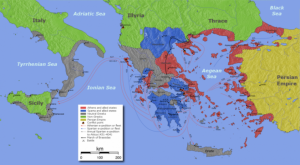“The arrow would be worth a great deal if it could tell men of honor from the rest,” said a Spartan hoplite as his integrity was questioned by an Athenian citizen.
The soldier had become a prisoner of war after the conflicts at Pylos and Sphacteria. His presence and reply were baffling. The courage of Spartan soldiers was renowned throughout the Greek world, a legacy cemented by King Leonidas’s heroic stand at the Battle of Thermopylae in 480 BCE.
But these Spartan prisoners had surrendered in what seemed to be a glaring contradiction of the “death before dishonor” attitude expected from them. What had caused the greatest warriors of their time to lay down their arms?

(The extent of conflict during the Peloponnesian War, 431 BCE to 404 BCE)
To answer this, it should first be asked: why was the idea of Spartan heroism so important? And what made this situation different? Even today, Spartans are renowned as an ultimate military machine, the epitome of soldiers and their ethos.
Read more HERE
Ask me anything
Explore related questions





